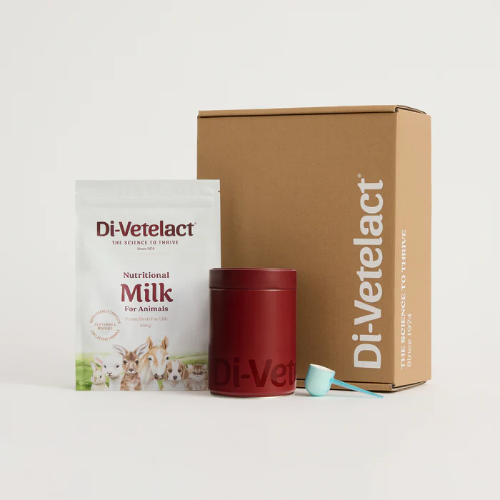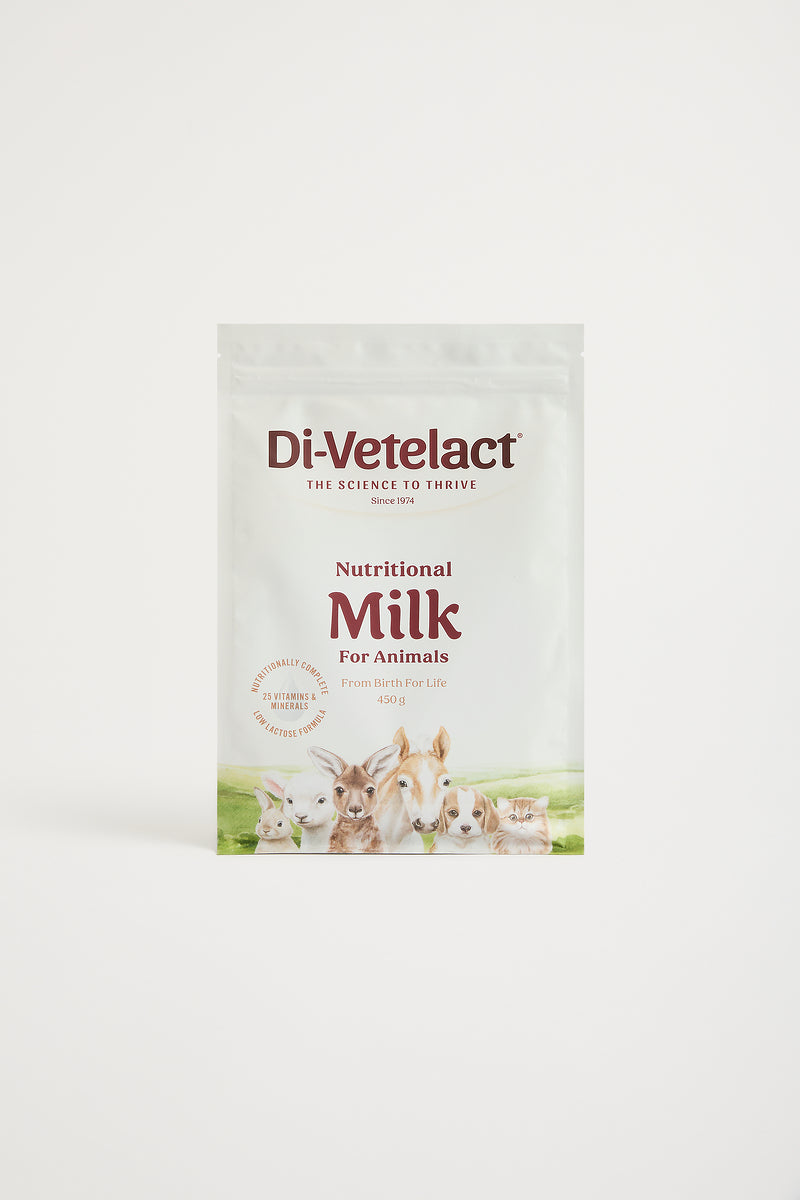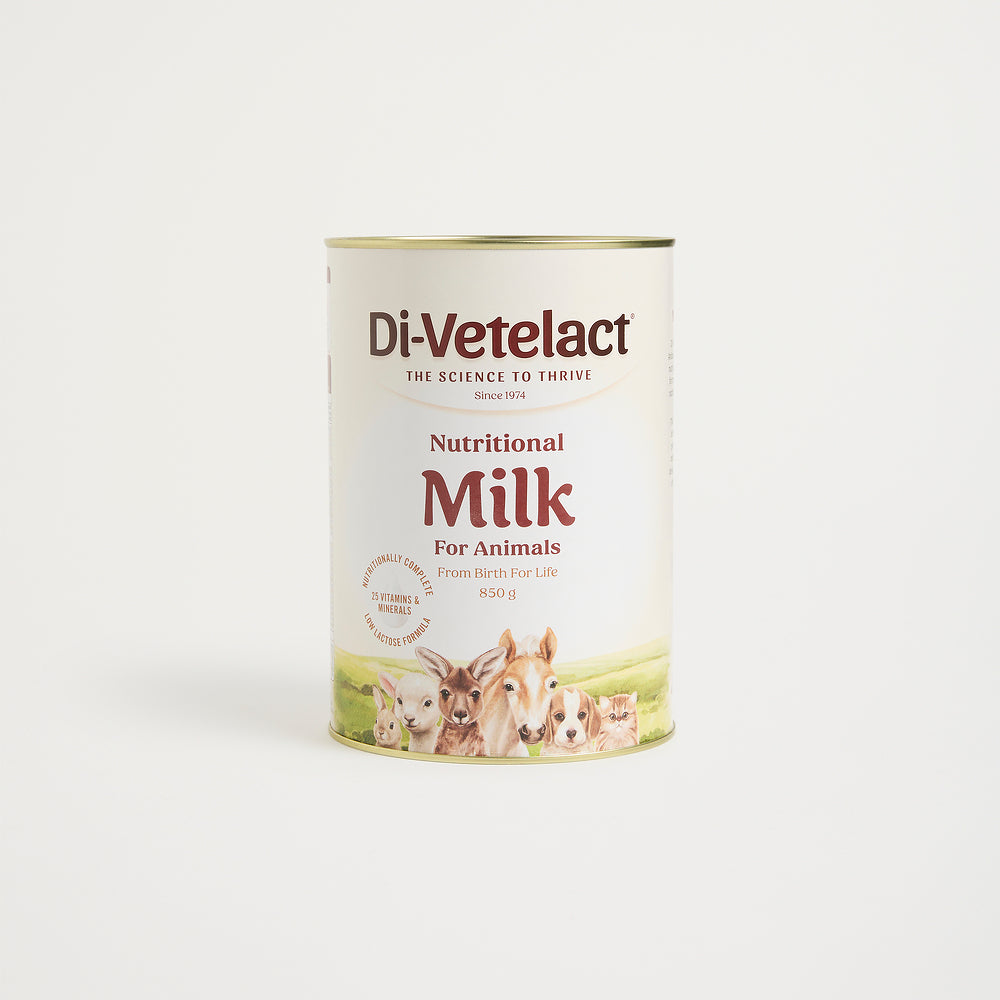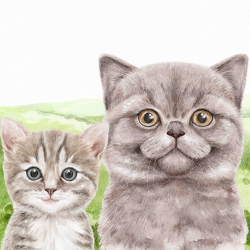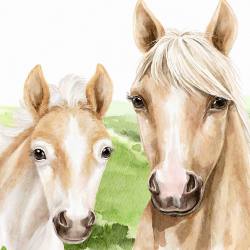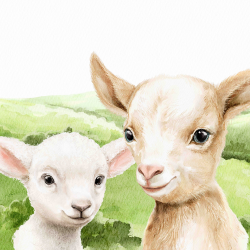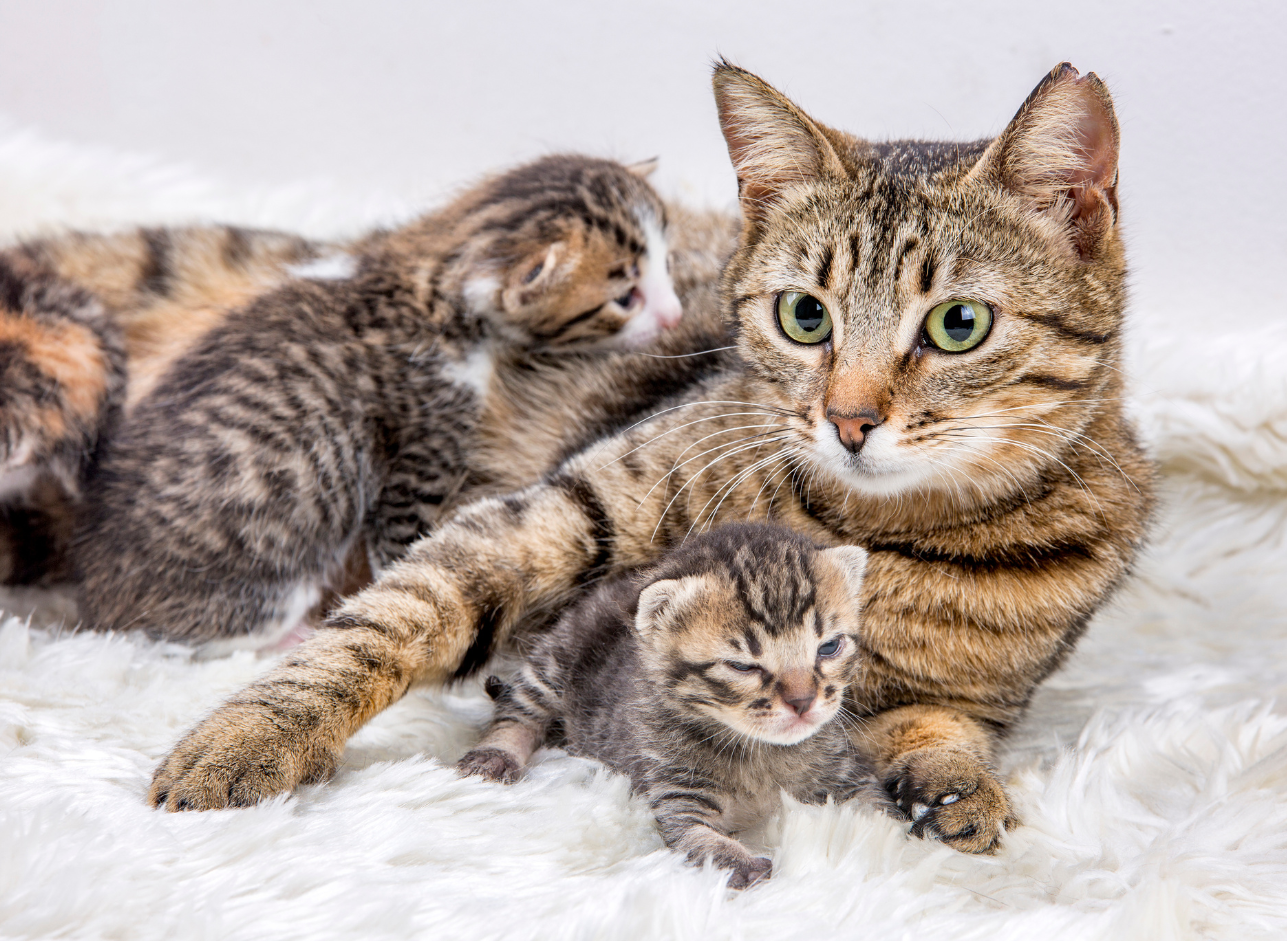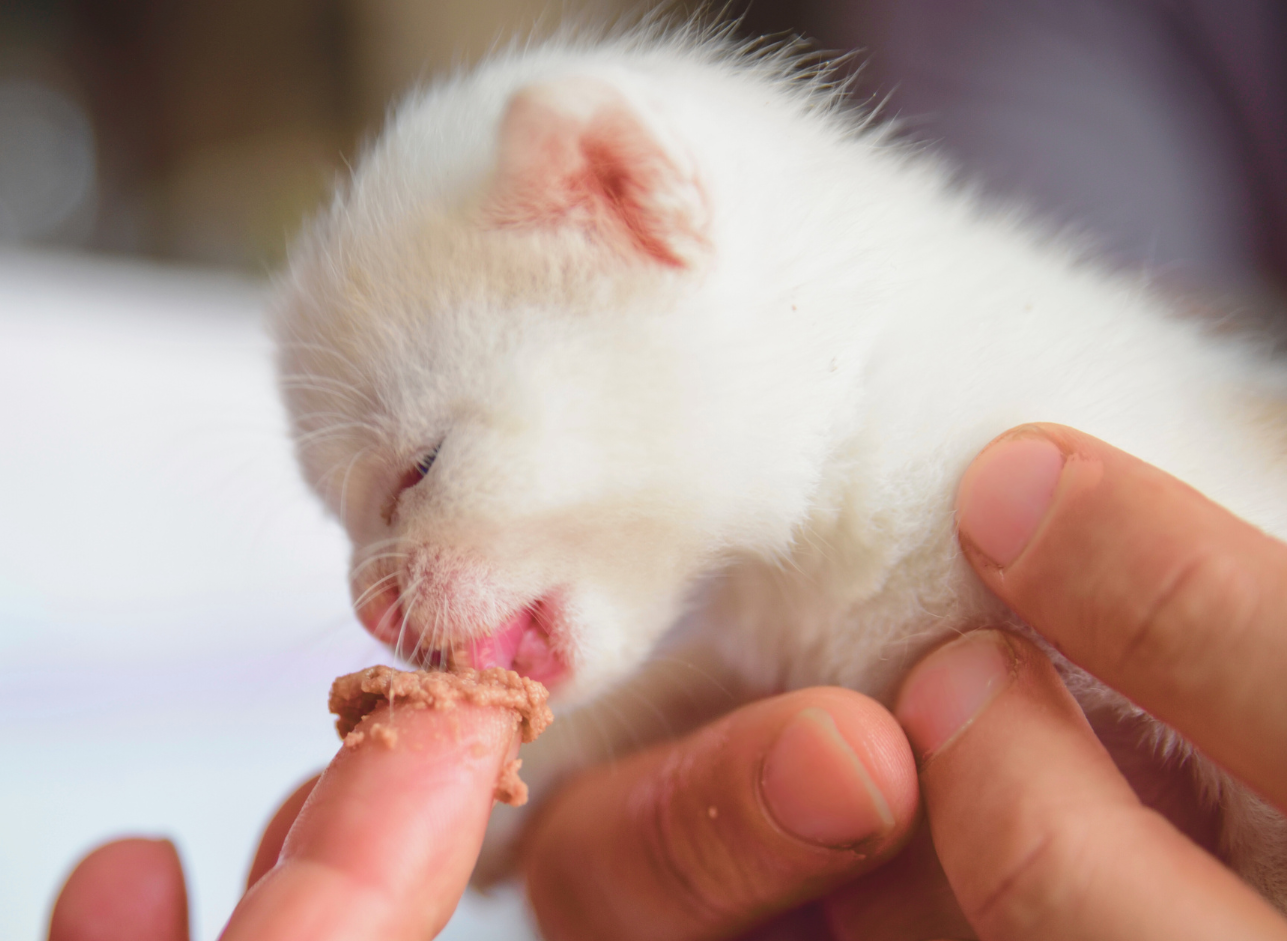Pregnancy and lactation are two of the most nutritionally demanding life stages for a dog. As her body works overtime to support developing puppies and produce nourishing milk, the dam’s energy and nutrient needs increase significantly especially during peak lactation. To help ensure her optimal health and the health of her litter, it's important to provide a diet to meet these heightened demands. That’s where a complete, balanced supplement like Di-Vetelact Nutritional Milk can help, providing extra support when it’s needed most.
Di-Vetelact Nutritional Milk is highly digestible and low in lactose and provides a well-tolerated additional source of energy and protein for her diet. The well-balanced mix of all 25 essential vitamins and minerals support the additional nutrient needs of pregnancy and lactation. Plus, the prebiotics in Di-Vetelact can help restore a healthy gut flora which may have been disrupted during the stress of pregnancy and lactation.
Let’s learn more about the nutritional needs for dogs during pregnancy and lactation, and how nutrition can play a big part in achieving a successful outcome – a healthy mum and a thriving litter of puppies.
Why is nutrition important for pregnant and lactating dogs?
Optimal nutrition is vital for successful breeding of puppies, both for the health of the mother and the outcome of the pregnancy.
Poor nutrition of the dog before mating and during pregnancy plays a major role in neonatal puppy mortality, which is estimated to be between 20 and 30 percent. The lack of access to adequate nutrition during pregnancy has been shown to affect the immune systems of both the dam and her pups.
Malnourishment of the dog can occur as the result of feeding a diet that is poor-quality and imbalanced, or insufficient amounts of good-quality diets. This can cause:
- low conception rates
- birth defects
- problems carrying the entire litter to term
- dystocia (labour difficulties), and
- Improper mammary development, which reduces the quality and amount of the milk and colostrum produced.
Overweight dams, as well as those who are underweight, can experience these problems. In addition to to this, they are at risk of false pregnancies and difficult or prolonged labour.
How does the dog’s nutritional requirements change during gestation and lactation?
Nutritional needs don’t change dramatically for the first 5 weeks of gestation. However for the last 4 weeks, the pregnant dam’s nutrient requirements increase by 30-50% depending on the size of her litter.
The energy requirements for a lactating dog are higher than at any other life stage. Sometimes it’s even higher than that during peak puppy growth periods, and up to 3 times maintenance requirements of her standard dog diet. The larger the litter, the greater the nutrient requirements of a dam, as her volume of milk produced is higher.
The size of the dog breed and the temperament of the dam also influence her energy requirements. Smaller dog breeds tend to have a greater energy requirement per kg of body weight. A temperamental or nervous dam will expend more energy and also have a higher requirement.
As a rough guide - at peak lactation in the 3rd and 4th weeks - a dam’s food intake should be increased by 25 percent per puppy above what is usually required to maintain her body weight.
For example:
- If a dam normally requires 4 cups of dog food to maintain her body weight and has a litter of 6 pups, feed her a total of 10 cups a day.
How can these increased nutritional needs for the dog be met?
Some dams struggle to eat the amount of food required to meet their increased nutrient needs. Commonly, this is due to lack of space in the abdomen and a drop in appetite in late pregnancy. Providing small frequent meals of a premium, high energy / protein complete and balanced growth food will enable most dams to receive adequate nutrition.
The dam’s weight should be monitored during the pregnancy. Compared to her pre breeding weight, ideally she should be:
- Approximately 15-25% heavier at whelping
- Approximately 5-10% heavier after delivery
Insufficient weight or excessive weight gain during pregnancy should be avoided.
Post Birth - Monitor her closely..
Most dams refuse food approximately 12 hours prior to whelping. After giving birth, she must resume intake of a highly palatable, good-quality food as soon as possible.
After whelping, some dams, especially those that are inexperienced may be reluctant to leave the pups; some females are extremely thin for a few days after whelping. Food and water should be brought to her if necessary.
In some cases, the sheer volume of food required to meet the demands of lactation may lead to diarrhoea.
Under what circumstances is it appropriate to supplement the dams diet?
- If the dam is underweight during pregnancy and/or lactation
- If she develops diarrhoea when eating the high volume of food required to meet her needs
- If her milk production is inadequate to meet the needs of the puppies, whose growth may be sub-optimal.
- If she has been fed a poorly balanced home prepared diet
What type of supplement should be used for a pregnant and lactating dog?
Providing a complete supplement with a balanced source of nutrients such as Di-Vetelact Nutritional milk is recommended.
In nearly all situations, if the dam is unable to meet all her nutrient needs with a premium growth formula, she needs an additional source of all nutrients. This should be provided by a complete supplement such as Di-Vetelact Nutritional Milk and not by a *single nutrient supplement* i.e.’calcium’ or ‘protein’ supplements.
For example:
Calcium given as a supplement can be dangerous and can actually cause hypocalcaemia (low blood calcium levels) because it down-regulates parathyroid hormone synthesis and secretion, which reduces the mother’s ability to meet demands for calcium mobilisation.
………
Ensuring that a pregnant or lactating dog receives optimal nutrition is essential for her health, the wellbeing of her puppies, and the overall success of breeding. While a high-quality, nutrient-dense diet forms the foundation, some dogs may need additional nutritional support to meet the extreme demands of gestation and lactation. In these cases, a complete, balanced supplement such as Di-Vetelact Nutritional Milk can play a critical role. It provides an easily digestible, nutrient-rich solution that helps maintain the dam’s condition, supports healthy milk production, and gives puppies the best possible start to life—leading to stronger litters and a healthier, more resilient mum.
*We do not recommend supplementing an already complete and balanced feed with additional minerals or vitamins unless under the guidance of your vet to correct a diagnosed nutrient deficiency.

